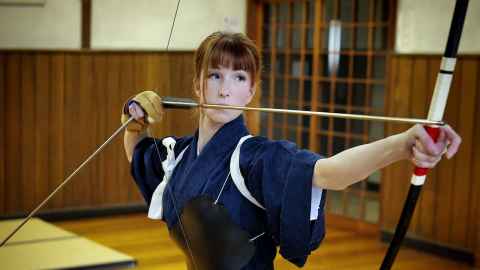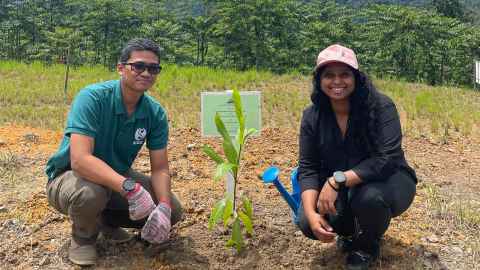Alumni around the globe
30 May 2025
Alumni in Japan, Ireland and Malaysia share their stories with James Fyfe.

Jessica Gerrity: Saitama, Japan
More than 20 years after moving to Japan, Jessica Gerrity is something of a minor celebrity in her adopted country.
As a regular on TV and an expert in Japanese archery, she’s amassed more than 300,000 followers on social media with her @jessintokyo handle. She also works as a tourism and PR ambassador for her home prefecture of Saitama.
Jessica’s connection with Japan began by chance while studying at the University of Auckland. After befriending a half-Japanese classmate, she ended up visiting Japan with her new friend. That led to a deep fascination with the country and in 2003, Jessica, who graduated with a Bachelor and Master of Planning, moved to Tokyo to teach English.
“I soon realised Japanese skills were necessary to work in any other field apart from English language, so I gave up pursuing planning work,” she says.
However, as her Japanese improved, other opportunities arose and she soon found herself appearing regularly on TV, building up a solid social media presence in the process.
Years later, another serendipitous encounter – this time with kyūdō, or the martial art of Japanese archery – also influenced the direction of her life.
“I saw it by chance about 14 years ago and it really made an impact on me,” she says.
Now, kyūdō is firmly at the centre of Jessica’s life. Not only does she hold a third-degree black belt, but she also writes kyūdō-related articles in both Japanese and English and is the editor of Kyudo World Magazine.
I saw it by chance about 14 years ago and it really made an impact on
me.
And with a plethora of followers online, she’s helping educate thousands around the world about the martial art and inspire them to give it a go.
She also balances her kyūdō practice and TV work with promoting Saitama, a region that neighbours Tokyo and is located on Honshu – Japan’s largest island.
Jessica says one of the more difficult parts of her life in Japan is balancing her work and kyūdō commitments with raising her three children – one of whom was born with mental and physical disabilities (microcephaly and epilepsy).
“Navigating childbirth, childrearing and having a child with special needs in a foreign country has been very challenging,” she says.
“But kyūdō has given me a really resilient sort of a mindset and taught me to take things as they come and just go with the flow.”

Mulenga Chilumba: Dublin, Ireland
It might have taken him a while to tune in to the local accent, but University of Auckland alumnus Mulenga Chilumba is now thriving in Ireland as an engineer helping the country reach its renewable energy goals.
Zambian-born Mulenga is based in Dublin, where he works as a senior engineer for the state-owned electricity transmission system operator, EirGrid.
He’s part of the team building offshore wind farms, which are critical to Ireland reaching its goal of obtaining 80 percent of its energy through renewable means by 2030.
“The concept of offshore wind energy is new to Ireland, so there’s a lot of learning and you really have to get your hands into it with the details,” says Mulenga.
He describes the role as challenging but highly rewarding, forcing him to “apply all the principles” he learnt during his Master of Energy, which he completed at the University in 2016.
The concept of offshore wind energy is new to Ireland, so there’s a lot of learning.
Mulenga moved to New Zealand after working for Zambia’s Rural Electrification Authority, where he was tasked with installing solar systems in rural areas and expanding the country’s electricity grid. He was drawn to study in New Zealand by its high use of renewable energy as well as the University’s international reputation.
“The approach to education was a bit different from what I’m used to, but in a good sense,” he says.
He credits his masters from the University with opening doors around the world.
He was impressed by the structure of the degree, which focused not just on the technical aspects of energy engineering but also covered topics such as project management and energy economics.
“It really shaped me and helped me to be where I am today. It made me a complete engineer.”
Aside from his studies, he enjoyed taking part in extracurricular activities, such as the University’s Christian Club and visiting Auckland’s beaches.
In his time off in Ireland, where he has lived for the past two years with his wife and three young boys, he also likes to see the local sights, and indulge his love of music.
“I sing and play guitar; it helps to unwind and just do something different,” he says.

Kuala Lumpur-based Dr Agkillah Maniam is on a mission to make forestry more sustainable.
After completing a PhD in Politics and International Relations at the University of Auckland in 2019, Agkillah is now director of forest management at the Malaysian Timber Certification Council. She’s also the co-founder of the Green Spine Network, a company dedicated to biodiversity, and forest and wildlife conservation in her home country.
Born and raised in Penang, Agkillah first moved to Kuala Lumpur for tertiary study. She remembers with fondness her later time at the University of Auckland, which introduced her to a new, more sustainable, way of thinking.
“New Zealand really taught me to focus on processes rather than what most Asian countries do, which is to focus on results,” she says. “All my life I’ve been pushed to produce results. You go to school, you get the As, but nobody talks about your well-being that much.”
Now, she tries to implement that same philosophy back home.
“When I work with my teams and the people I mentor, I tell them, if you understand the process right and you do things with integrity and intention, then don’t worry about the results – they will come through.”
Agkillah originally planned to go into academia after graduating, but circumstances changed when she returned to Malaysia.
If you understand the process right and you do things with integrity and
intention, then don’t worry about the results – they will come through.
“When I started doing more hands-on, practical work on the ground, I realised, ‘hey, this is where I want to be’.”
In her Malaysian Timber Certification Council role, Agkillah focuses on ensuring timber is grown and harvested sustainably.
“I think the way forward is to remove logging from natural forests and just focus on forest plantations in other agricultural areas. That way the natural forest is allowed to remain as it is, recuperate and be restored,” she says.
“But that doesn’t mean we don’t have to find other ways to get timber, because we know wood is so essential to many communities around the world. We just have to find another way to do it.”
This article first appeared in the Autumn 2025 issue of Ingenio.